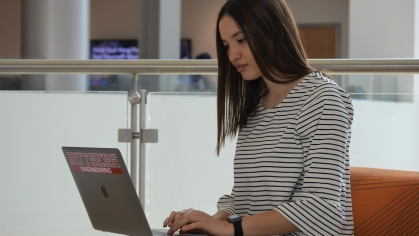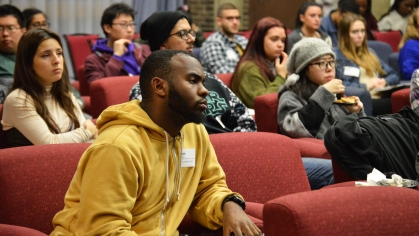Interview Success Strategies
Common Types of Interviews
Virtual/Telephone Interviews – Some employers screen candidates using video conferencing or telephone before a face-to-face interview. See the “Success Strategies for Virtual/Telephone Interviews” article for tips to succeed in these types of interviews.
Group Interviews– An employer interviews multiple candidates simultaneously. A group interview is a good opportunity to show the employer your ability to engage in a room full of people, speak with authority and share your expertise. Some tips for success in group interviews:
- Be Prepared
- Be Confident
- Answer First on Occasion
- Listen Carefully
- Show Your Interest Using Your Body Language
- Be Respectful
Case Interviews– A common interview format with consulting firms, this type of interview involves analyzing and solving a challenging problem. Thoroughly review all the instructions to ensure you can come up with logical steps to solve the problem. Some tips for success in case interviews:
- Ask Interviewers Clarifying Questions
- Evaluate Data Thoroughly
- Produce evidence-supported conclusions
Panel Interviews– Multiple people interview you at once and each person will usually have an opportunity to ask you questions. Some tips for success in lunch/dinner interviews:
- Try to obtain the names & job titles of each member of the panel prior to the interview and research their background.
- Bring enough materials for the entire panel – additional copies of your resume and any other written material you would like to share.
- Engage with every interviewer equally. Make eye contact with each person when answering questions.
Lunch/Dinner Interviews– This is more than a free meal! Some employers might want to evaluate you in a social setting especially if the position involves interacting with clients in these types of settings. Some tips for success in lunch/dinner interviews:
- It is not about the food. The focus is on the interview and how you interact and communicate. You can’t communicate with food in your mouth, so take small bites that you can finish quickly and spend more time conversing than eating. Avoid ordering messy foods.
- Manners matter: In addition to “please” and “thank you”, there are numerous etiquette rules that may be challenging to remember. The golden rule is to follow the lead of your host when it comes to choosing what to order and when to start and stop eating.
- Plan in advance: Map out directions to ensure prompt arrival. Plan topics of conversation about yourself, the employer. Avoid politics and religion.
Behavioral Interviews – This is based on the concept of using past behavior as a way of predicting future performance. The interviewer will ask for specific examples of how a skill has been demonstrated in the past. See the “Are You Ready for a Behavioral Interview” for tips to succeed in this type of interview.
Preparing for the Interview
- Research the employer to obtain as much information as possible including the organization’s mission statement, values, products and services, structure and competitors. Use various resources such as the employer’s website, glassdoor.com, Vault Industry Guides (online resource available in Rutgers Handshake), and LinkedIn.
- Research the position and be able to discuss the skills and qualities you possess that make you a good candidate for the role.
- Review your background including coursework, academic/research projects, activities, internship and work experience. Be prepared to provide examples of the skills and qualities you have developed that are relevant to the position.
- Practice interviewing. Schedule an appointment with a career advisor for a mock interview. Also, use Big Interview Resume, an online resource in Rutgers Handshake.
Interview Day
- Check your appearance and grooming because it makes an important first impression. Don’t forget the little things – shine your shoes, make sure your nails are clean and tidy, check your clothes for holes, stains, pet hair and loose threads. Dress appropriately for all interviews.
- Make sure you bring extra copies of your resume.
- Arrive 10 to 15 minutes early.
- Relax and collect your thoughts.
During the Interview
- Greet the interviewer(s) with a smile while making good eye contact. Refer to the interviewer using Mr., Ms., or Dr. unless you are invited to use the first name. Covid-19 impacted us in many ways including our level of comfort with physical contact. Traditionally, an interview would start with a firm handshake. Now, that is not necessarily the case. When it comes to shaking hands, you can take your cue from the employer. If they extend their hand, it is certainly appropriate to shake hands if you are comfortable doing so. If not, you can politely decline by saying “Please forgive me, I no longer shake hands.” The key to this response is tone. It must be pleasant.
- If your religion or culture does not allow you to shake hands, you can place your hand over your heart and say “I’m sorry, but my religion does not allow me to shake your hand. Thank you for the opportunity to meet with you today.”
- Be yourself. Display energy, confidence, and a positive attitude. Demonstrate enthusiasm and sincere interest.
- Listen closely and answer the questions with relevant information.
- Provide specific and detailed examples of how you have demonstrated key strengths and skills including the ability to learn quickly, communicate effectively, analyze and solve problems, work in a team, and others.
- Ask good questions, which are relevant to the position and employer.
- Be prepared to discuss everything on your resume in depth. Emphasize your strengths.
- Be aware of your non-verbal communication, especially your posture. Don’t appear too rigid or overly relaxed. Don’t fidget. Maintain eye contact.
- Watch your grammar. Interviewers are impressed by articulate candidates. Use pauses rather than “ums” and “uhs.”
- Stay positive. Never criticize an employer, teacher, friend, colleague, or school.
- Never mention salary or benefits in an interview. Let the employer bring up these topics. Research the career field and industry and be prepared to discuss your salary requirements. Be realistic and have an accurate salary range in mind. Emphasize that your salary requirements are flexible.
- At the close of the interview, take these steps to leave the employer with a positive impression:
- Ask for a business card/contact information.
- Ask about the next steps in the process and a time frame that you can expect to hear from the employer.
- Emphasize your interest in the position and the organization.
- Thank the interviewer(s).
Interview Knockout Factors
- Being late.
- Poor personal appearance.
- Unprepared for the interview. Lack of knowledge about the employer.
- Inability to express ideas clearly; poor communication skills.
- Poorly defined career goals; little or no career direction.
- Limited interest in the employer.
- Negative attitude toward former jobs, supervisors, or colleagues.
- Not answering the interview questions directly; making excuses during the interview.
- Not asking questions about the position or employer or asking inappropriate questions.
- Lack of confidence/poise; poor body language/eye contact.
- Only interested in salary and benefits.
After the Interview
- Write down pertinent facts from the interview (names of interviewers, important discussion points).
- Within 24 hours, write a short thank you letter or email message to the interviewer(s) emphasizing your key qualifications and interest in the position/organization.


